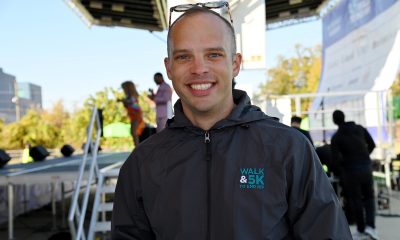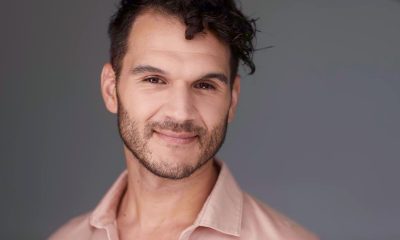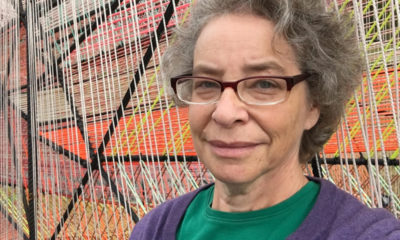Books
Nonbinary poet unmasks society’s gender expectations in new collection
Karen Poppy’s ‘Diving At The Lip Of The Water’ debuts next week

“I started to compose poetry around the age of three – before I could even write,” poet Karen Poppy, 47, told the Blade in a telephone interview. “My Mom would write my poems down.”
“I had the good fortune,” added Poppy, whose first, full-length poetry collection “Diving At The Lip Of The Water” will be out from Beltway Editions, a Washington, D.C. area press, on May 1, “My Mom read poetry to me. The first poem was about a nightingale. Maybe she read Keats to me.” (John Keats was the 19th century Romantic poet who wrote “Ode to a Nightingale.”)

Poppy has written a book “that will rough a reader up and then wrap their scraps in silk,” poet Francesca Bell has said of “Diving At The Lip of The Water.” For Poppy, who identifies as queer, nonbinary, lesbian and an artist, coming out has been a lifelong process. “I’ve come out many times in many ways,” Poppy, who grew up in Foster City, Calif., and now lives in the San Francisco Bay area, said.
April is National Poetry Month. In every month, Poppy thinks often of Walt Whitman, one of the United States’ greatest poets. Thought by many to be queer, Whitman, a nurse in Washington, D.C. during the Civil War, is best known for his groundbreaking work “Leaves of Grass.”
Whitman comes to mind to Poppy when she talks about her identity. “As an artist,” Poppy said in reference to how she identifies, “I’m everyone and everything.”
When Whitman talks about the self containing “multitudes,” “He’s not just speaking of individuals,” Poppy said, “he’s saying that poets-artists enter into everything.”
“As an artist – a poet,” Poppy said, “I don’t like to be put into boxes.”
Poppy celebrates Whitman’s creative spirit, refusal to have limitations placed on him and, what she called, “his joyous experience of limitlessness and connectivity with everything.”
As a young child, Poppy sensed that she was different. “I knew very early on,” she said, “I wanted to be like my mother and my father.”
She wanted to be glam like her mom. “My Mom’s family’s nickname for Mom was Miss America,” Poppy said.
She wore her Dad’s leather jacket, cowboy hat and cowboy boots. “Early on, I got in trouble for trying to smoke a cigarette,” Poppy said, “I put it in the wrong way. I was lucky I didn’t burn my mouth!”
“I cut my mouth, trying to shave as a toddler,” she added, “I was already creating my own gender identity.”
At a time, when people were far less out and proud than now, Poppy crushed on her girl babysitters. “In kindergarten, I got in trouble with my best friend at the time,” she said, “because I told her that I was interested in her physically.”
“I think she was very kind about it,” Poppy added.
That same year, Poppy was reprimanded by her teacher for kissing a boy. “The boy and I were in line waiting to go back to the classroom,” she said, “he kissed me back.”
During that era, Poppy didn’t have the words to name or describe her feelings. “I have a gay cousin who’s older than me,” she said, “and a lesbian aunt. But because they weren’t exactly the way I am, I didn’t realize I was queer, too.”
In Foster City, when she was growing up, people didn’t talk openly about being queer. “We talked about it in euphemisms and negatively,” Poppy said.
A poem is never just the story of what happened or the recitation of fact, poet Sheila Black, a 2012 Witter Bynner Fellow, said in an email to the Blade.
Poppy’s poetry, like that of many poets, at times, channels her life. Though, it’s not autobiographical in a literal or linear way. Like Whitman’s work, it contains multitudes from individual and collective experience.
Her searing, moving collection “Diving At The Lip Of The Water,” unmasks society’s gender expectations and family systems. Poppy’s poem, “No One was Gay Back Then,” draws us into what it’s like to have to hide your sexuality. “We used to make fun of you/You, making out with Michael/in the grass. 5th grade recess,” the poem begins.
“Michael liked Matt. So in 5th grade,” Poppy writes in the poem, “already seeking cover-ups/Trying to convince everyone and ourselves./Our small town. No one was gay back then.”
As a tween, Poppy not only realized she was queer (though she didn’t have the word for it); she knew where she wanted to go to college. Poppy was determined to go to Smith College because Sylvia Plath went there.
“When I was 12, I started to read Sylvia Plath,” Poppy said. “Plath has been a profound influence on me throughout my life.”
“Because of her fearlessness in speaking her truth,” Poppy added, “and her high level of poetic virtuosity.”
Poppy’s dream came true. She earned a bachelor’s degree from Smith College in Comparative Literature and Spanish in 1998.
At Smith, Poppy began to come out about her identity. But, there were pressures. “I was pressured into cutting my hair short,” she said, “the feeling was if I kept my hair long, I wasn’t a dyke.”
Poppy cut her hair. “I did cry,” she said, “there was a pressure to conform to a certain aesthetic. You had to be super femme or butch.”
It was another box that she had a hard time escaping from. “I realized boxes are not for me,” Poppy said.
She wasn’t sure what she wanted to do after she graduated from Smith. After a short stint as a chef apprentice, Poppy could tell that being a chef for the long term wasn’t for her.
Like most poets, Poppy knew being a bard rarely brings financial stability. “I wanted to have security and I wanted to help people,” Poppy said.
“I went to law school and studied international law,” she said, “A lot of my early focus was on immigration and helping refugees.”
Poppy graduated from UC Hastings College of the Law (now known as UC College of the Law, San Francisco) in 2003 with a J.D. degree in international law.
Today, Poppy works for The Hartford in the area of workers’ compensation.
Poppy kept writing from her childhood into her 20s. “But then, somebody said something really cruel about my writing,” she said. “The ridicule chilled my creativity.”
For 17 years, because of this cruelty, she didn’t write. “I was in a creative silence,” Poppy said.
A traumatic event compelled her to go back to writing.
Since 2017, when her creativity was restarted, Poppy’s poetry has been published in literary journals, anthologies as well as the chapbooks “Crack Open/Emergency,” “Our Own Beautiful Brutality” and “Every Possible Thing.” She’s written three unpublished novels and short stories.
One of her writing projects is Whitmanesque in its intersections of identities.
Poppy is working on an opera libretto. “It takes place when Handel [the German-British Baroque composer] was alive,” she said.
It’s about a merboy who’s washed to shore. He’s young, Black and queer.
“A family takes him in,” Poppy said, “they want to make him a form of income.”
The family forces the merboy to become a castrato, Poppy said, “they make him wear a mask to hide his dark skin. When he’s older and has a relationship with a man, he has to be closeted.”
Poppy is looking for a composer to work with her on her libretto. If you’re interested, contact her through her website karenpoppy.com.
Poppy’s interest in immigrants is personal as well as professional. Poppy is Jewish. Some of her family were murdered in the Holocaust. “Others in my family left Europe before the Holocaust because of pogroms and poverty,” she said.
When her family came to the United States in the early 1900s, they were “very poor,” Poppy said.
Her paternal grandmother, Poppy said, told her to make sure her son always had food, “because hunger would make his stomach hurt.”
We’ve come to see that the American dream is in many ways an illusion, Poppy said. It’s not accessible to all, and it’s slipping away.
“Elizabeth/The fifth of ten children/Who crossed the border, then/Still a child/,” Poppy writes in her poem “Elizabeth,” “Only sixteen and wanting to stay alive/To be the breath that survived.”
Poppy worries about the rise of anti-Semitism. “It comes in waves,” she said. “We have to remind each other to make sure it never happens again.”
It’s important for artists to take care of themselves, Poppy said. To get enough rest between creative projects. To be an athlete. So their minds and spirits can be in top form.
Poppy does yoga and loves to run. “A poem is a short lap,” she said, “writing a novel is like long distance open water swimming.”
“We write out of our humanity,” Poppy added.
The Blade may receive commissions from qualifying purchases made via this post.
Books
Love or fear flying you’ll devour ‘Why Fly’
New book chronicles a lifetime obsession with aircraft

‘Why Fly’
By Caroline Paul
c. 2026, Bloomsbury
$27.99/256 pages
Tray table folded up.
Check. Your seat is in the upright position, the airflow above your head is just the way you like it, and you’re ready to go. The flight crew is making final preparations. The lights are off and the plane is backing up. All you need now is “Why Fly” by Caroline Paul, and buckle up.

When she was very young, Paul was “obsessed” with tales of adventure, devouring accounts written by men of their derring-do. The only female adventure-seeker she knew about then was Amelia Earhart; later, she learned of other adventuresome women, including aviatrix Bessie Coleman, and Paul was transfixed.
Time passed; Paul grew up to create a life of adventure all her own.
Then, the year her marriage started to fracture, she switched her obsession from general exploits to flight.
Specifically, Paul loves experimental aircraft, some of which, like her “trike,” can be made from a kit at home. Others, like Woodstock, her beloved yellow gyrocopter, are major purchases that operate under different FAA rules. All flying has rules, she says, even if it seems like it should be as freewheeling as the birds it mimics.
She loves the pre-flight checklist, which is pure anticipation as well as a series of safety measures; if only a relationship had the same ritual. Paul loves her hangar, as a place of comfort and for flight in all senses of the word. She enjoys thinking about historic tales of flying, going back before the Wright Brothers, and including a man who went aloft on a lawn chair via helium-filled weather balloons.
The mere idea that she can fly any time is like a gift to Paul.
She knows a lot of people are terrified of flying, but it’s near totally safe: generally, there’s a one in almost 14 million chance of perishing in a commercial airline disaster – although, to Paul’s embarrassment and her dismay, it’s possible that both the smallest planes and the grandest loves might crash.
If you’re a fan of flying, you know what to do here. If you fear it, pry your fingernails off the armrests, take a deep breath, and head to the shelves. “Why Fly” might help you change your mind.
It’s not just that author Caroline Paul enjoys being airborne, and she tells you. It’s not that she’s honest in her explanations of being in love and being aloft. It’s the meditative aura you’ll get as you’re reading this book that makes it so appealing, despite the sometimes technical information that may flummox you between the Zen-ness. It’s not overwhelming; it mixes well with the history Paul includes, biographies, the science, heartbreak, and exciting tales of adventure and risk, but it’s there. Readers and romantics who love the outdoors, can’t resist a good mountain, and crave activity won’t mind it, though, not at all.
If you own a plane – or want to – you’ll want this book, too. It’s a great waiting-at-the-airport tale, or a tuck-in-your-suitcase-for-later read. Find “Why Fly” and you’ll see that it’s an upright kind of book.
The Blade may receive commissions from qualifying purchases made via this post.
Books
New book profiles LGBTQ Ukrainians, documents war experiences
Tuesday marks four years since Russia attacked Ukraine

Journalist J. Lester Feder’s new book profiles LGBTQ Ukrainians and their experiences during Russia’s war against their country.
Feder for “The Queer Face of War: Portraits and Stories from Ukraine” interviewed and photographed LGBTQ Ukrainians in Kyiv, the country’s capital, and in other cities. They include Olena Hloba, the co-founder of Tergo, a support group for parents and friends of LGBTQ Ukrainians, who fled her home in the Kyiv suburb of Bucha shortly after Russia launched its war on Feb. 24, 2022.
Russian soldiers killed civilians as they withdrew from Bucha. Videos and photographs that emerged from the Kyiv suburb showed dead bodies with their hands tied behind their back and other signs of torture.

Olena Shevchenko, chair of Insight, a Ukrainian LGBTQ rights group, wrote the book’s forward.

The book also profiles Viktor Pylypenko, a gay man who the Ukrainian military assigned to the 72nd Mechanized Black Cossack Brigade after the war began. Feder writes Pylypenko’s unit “was deployed to some of the fiercest and most important battles of the war.”
“The brigade was pivotal to beating Russian forces back from Kyiv in their initial attempt to take the capital, helping them liberate territory near Kharkiv and defending the front lines in Donbas,” wrote Feder.
Pylypenko spent two years fighting “on Ukraine’s most dangerous battlefields, serving primarily as a medic.”
“At times he felt he was living in a horror movie, watching tank shells tear his fellow soldiers apart before his eyes,” wrote Feder. “He held many men as they took their final breaths. Of the roughly one hundred who entered the unit with him, only six remained when he was discharged in 2024. He didn’t leave by choice: he went home to take care of his father, who had suffered a stroke.”
Feder notes one of Pylypenko’s former commanders attacked him online when he came out. Pylypenko said another commander defended him.
Feder also profiled Diana and Oleksii Polukhin, two residents of Kherson, a port city in southern Ukraine that is near the mouth of the Dnieper River.
Ukrainian forces regained control of Kherson in November 2022, nine months after Russia occupied it.
Diana, a cigarette vender, and Polukhin told Feder that Russian forces demanded they disclose the names of other LGBTQ Ukrainians in Kherson. Russian forces also tortured Diana and Polukhin while in their custody.
Polukhim is the first LGBTQ victim of Russian persecution to report their case to Ukrainian prosecutors.

Feder, who is of Ukrainian descent, first visited Ukraine in 2013 when he wrote for BuzzFeed.
He was Outright International’s Senior Fellow for Emergency Research from 2021-2023. Feder last traveled to Ukraine in December 2024.
Feder spoke about his book at Politics and Prose at the Wharf in Southwest D.C. on Feb. 6. The Washington Blade spoke with Feder on Feb. 20.
Feder told the Blade he began to work on the book when he was at Outright International and working with humanitarian groups on how to better serve LGBTQ Ukrainians. Feder said military service requirements, a lack of access to hormone therapy and documents that accurately reflect a person’s gender identity and LGBTQ-friendly shelters are among the myriad challenges that LGBTQ Ukrainians have faced since the war began.
“All of these were components of a queer experience of war that was not well documented, and we had never seen in one place, especially with photos,” he told the Blade. “I felt really called to do that, not only because of what was happening in Ukraine, but also as a way to bring to the surface issues that we’d had seen in Iraq and Syria and Afghanistan.”

Feder also spoke with the Blade about the war’s geopolitical implications.
Russian President Vladimir Putin in 2013 signed a law that bans the “promotion of homosexuality” to minors.
The 2014 Winter Olympics took place in Sochi, a Russian resort city on the Black Sea. Russia annexed Crimea from Ukraine a few weeks after the games ended.
Russia’s anti-LGBTQ crackdown has continued over the last decade.
The Russian Supreme Court in 2023 ruled the “international LGBT movement” is an extremist organization and banned it. The Russian Justice Ministry last month designated ILGA World, a global LGBTQ and intersex rights group, as an “undesirable” organization.
Ukraine, meanwhile, has sought to align itself with Europe.
Ukrainian President Volodymyr Zelenskyy after a 2021 meeting with then-President Joe Biden at the White House said his country would continue to fight discrimination based on sexual orientation and gender identity. (Zelenskyy’s relationship with the U.S. has grown more tense since the Trump-Vance administration took office.) Zelenskyy in 2022 publicly backed civil partnerships for same-sex couples.
Then-Ukrainian Ambassador to the U.S. Oksana Markarova in 2023 applauded Kyiv Pride and other LGBTQ and intersex rights groups in her country when she spoke at a photo exhibit at Ukraine House in D.C. that highlighted LGBTQ and intersex soldiers. Then-Kyiv Pride Executive Director Lenny Emson, who Feder profiles in his book, was among those who attended the event.
“Thank you for everything you do in Kyiv, and thank you for everything that you do in order to fight the discrimination that still is somewhere in Ukraine,” said Markarova. “Not everything is perfect yet, but you know, I think we are moving in the right direction. And we together will not only fight the external enemy, but also will see equality.”
Feder in response to the Blade’s question about why he decided to write his book said he “didn’t feel” the “significance of Russia’s war against Ukraine” for LGBTQ people around the world “was fully understood.”
“This was an opportunity to tell that big story,” he said.
“The crackdown on LGBT rights inside Russia was essentially a laboratory for a strategy of attacking democratic values by attacking queer rights and it was one as Ukraine was getting closet to Europe back in 2013, 2014,” he added. “It was a strategy they were using as part of their foreign policy, and it was one they were using not only in Ukraine over the past decade, but around the world.”
Feder said Republicans are using “that same strategy to attack queer people, to attack democracy itself.”
“I felt like it was important that Americans understand that history,” he said.
Books
New book explores homosexuality in ancient cultures
‘Queer Thing About Sin’ explains impact of religious credo in Greece, Rome

‘The Queer Thing About Sin’
By Harry Tanner
c.2025, Bloomsbury
$28/259 pages
Nobody likes you very much.
That’s how it seems sometimes, doesn’t it? Nobody wants to see you around, they don’t want to hear your voice, they can’t stand the thought of your existence and they’d really rather you just go away. It’s infuriating, and in the new book “The Queer Thing About Sin” by Harry Tanner, you’ll see how we got to this point.
When he was a teenager, Harry Tanner says that he thought he “was going to hell.”
For years, he’d been attracted to men and he prayed that it would stop. He asked for help from a lay minister who offered Tanner websites meant to repress his urges, but they weren’t the panacea Tanner hoped for. It wasn’t until he went to college that he found the answers he needed and “stopped fearing God’s retribution.”
Being gay wasn’t a sin. Not ever, but he “still wanted to know why Western culture believed it was for so long.”
Historically, many believe that older men were sexual “mentors” for teenage boys, but Tanner says that in ancient Greece and Rome, same-sex relationships were common between male partners of equal age and between differently-aged pairs, alike. Clarity comes by understanding relationships between husbands and wives then, and careful translation of the word “boy,” to show that age wasn’t a factor, but superiority and inferiority were.
In ancient Athens, queer love was considered to be “noble” but after the Persians sacked Athens, sex between men instead became an acceptable act of aggression aimed at conquered enemies. Raping a male prisoner was encouraged but, “Gay men became symbols of a depraved lack of self-control and abstinence.”
Later Greeks believed that men could turn into women “if they weren’t sufficiently virile.” Biblical interpretations point to more conflict; Leviticus specifically bans queer sex but “the Sumerians actively encouraged it.” The Egyptians hated it, but “there are sporadic clues that same-sex partners lived together in ancient Egypt.”
Says Tanner, “all is not what it seems.”
So you say you’re not really into ancient history. If it’s not your thing, then “The Queer Thing About Sin” won’t be, either.
Just know that if you skip this book, you’re missing out on the kind of excitement you get from reading mythology, but what’s here is true, and a much wider view than mere folklore. Author Harry Tanner invites readers to go deep inside philosophy, religion, and ancient culture, but the information he brings is not dry. No, there are major battles brought to life here, vanquished enemies and death – but also love, acceptance, even encouragement that the citizens of yore in many societies embraced and enjoyed. Tanner explains carefully how religious credo tied in with homosexuality (or didn’t) and he brings readers up to speed through recent times.
While this is not a breezy vacation read or a curl-up-with-a-blanket kind of book, “The Queer Thing About Sin” is absolutely worth spending time with. If you’re a thinking person and can give yourself a chance to ponder, you’ll like it very much.
-

 Federal Government5 days ago
Federal Government5 days agoTwo very different views of the State of the Union
-

 Virginia5 days ago
Virginia5 days agoVa. activists preparing campaign in support of repealing marriage amendment
-

 Opinions4 days ago
Opinions4 days agoThe global cost of Trump’s foreign aid ideology
-

 Opinions4 days ago
Opinions4 days agoCriteria for supporting a candidate in D.C.




















